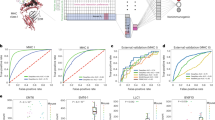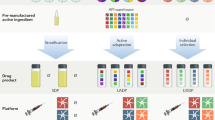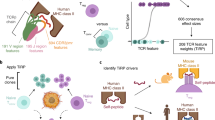Abstract
Pre-clinical studies have shown that injection of allogeneic T cells primed against a single minor histocompatibility antigen (MiHA) could cure hematologic cancers (HC) without causing any toxicity to the host. However, translation of this approach in humans has been hampered by the paucity of molecularly defined human MiHAs. Using a novel proteogenomic approach, we have analyzed cells from 13 volunteers and discovered a vast repertoire of MiHAs presented by the most common HLA haplotype in European Americans: HLA-A*02:01;B*44:03. Notably, out of >6000 MiHAs, we have identified a set of 39 MiHAs that share optimal features for immunotherapy of HCs. These ‘optimal MiHAs’ are coded by common alleles of genes that are preferentially expressed in hematopoietic cells. Bioinformatic modeling based on MiHA allelic frequencies showed that the 39 optimal MiHAs would enable MiHA-targeted immunotherapy of practically all HLA-A*02:01;B*44:03 patients. Further extension of this strategy to a few additional HLA haplotypes would allow treatment of almost all patients.
This is a preview of subscription content, access via your institution
Access options
Subscribe to this journal
Receive 12 print issues and online access
$259.00 per year
only $21.58 per issue
Buy this article
- Purchase on Springer Link
- Instant access to full article PDF
Prices may be subject to local taxes which are calculated during checkout





Similar content being viewed by others
References
Schumacher TN, Schreiber RD . Neoantigens in cancer immunotherapy. Science 2015; 348: 69–74.
Rosenberg SA, Restifo NP . Adoptive cell transfer as personalized immunotherapy for human cancer. Science 2015; 348: 62–68.
Sharma P, Allison JP . The future of immune checkpoint therapy. Science 2015; 348: 56–61.
Grupp SA, Kalos M, Barrett D, Aplenc R, Porter DL, Rheingold SR et al. Chimeric antigen receptor-modified T cells for acute lymphoid leukemia. N Engl J Med 2013; 368: 1509–1518.
Maus MV, Fraietta JA, Levine BL, Kalos M, Zhao Y, June CH . Adoptive immunotherapy for cancer or viruses. Annu Rev Immunol 2014; 32: 189–225.
Maus MV, Grupp SA, Porter DL, June CH . Antibody modified T cells: CARs take the front seat for hematologic malignancies. Blood 2014; 123: 2625–2635.
Reddy P, Maeda Y, Liu C, Krijanovski OI, Korngold R, Ferrara JL . A crucial role for antigen-presenting cells and alloantigen expression in graft-versus-leukemia responses. Nat Med 2005; 11: 1244–1249.
Vincent K, Roy DC, Perreault C . Next-generation leukemia immunotherapy. Blood 2011; 118: 2951–2959.
Mutis T, Brand R, Gallardo D, van BA, Niederwieser D, Goulmy E . Graft-versus-host driven graft-versus-leukemia effect of minor histocompatibility antigen HA-1 in chronic myeloid leukemia patients. Leukemia 2010; 24: 1388–1392.
Jenq RR, van den Brink MR . Allogeneic haematopoietic stem cell transplantation: individualized stem cell and immune therapy of cancer. Nat Rev Cancer 2010; 10: 213–221.
Roopenian D, Choi EY, Brown A . The immunogenomics of minor histocompatibility antigens. Immunol Rev 2002; 190: 86–94.
Mullally A, Ritz J . Beyond HLA: the significance of genomic variation for allogeneic hematopoietic stem cell transplantation. Blood 2007; 109: 1355–1362.
Granados DP, Laumont CM, Thibault P, Perreault C . The nature of self for T cells - a systems-level perspective. Curr Opin Immunol 2015; 34: 1–8.
Warren EH, Zhang XC, Li S, Fan W, Storer BE, Chien JW et al. Effect of MHC and non-MHC donor/recipient genetic disparity on the outcome of allogeneic HCT. Blood 2012; 120: 2796–2806.
Blazar BR, Murphy WJ, Abedi M . Advances in graft-versus-host disease biology and therapy. Nat Rev Immunol 2012; 12: 443–458.
Fontaine P, Roy-Proulx G, Knafo L, Baron C, Roy DC, Perreault C . Adoptive transfer of T lymphocytes targeted to a single immunodominant minor histocompatibility antigen eradicates leukemia cells without causing graft-versus-host disease. Nat Med 2001; 7: 789–794.
Meunier MC, Delisle JS, Bergeron J, Rineau V, Baron C, Perreault C . T cells targeted against a single minor histocompatibility antigen can cure solid tumors. Nat Med 2005; 11: 1222–1229.
Li N, Matte-Martone C, Zheng H, Cui W, Venkatesan S, Tan HS et al. Memory T cells from minor histocompatibility antigen-vaccinated and virus-immune donors improves GVL and immune reconstitution. Blood 2011; 118: 5965–5976.
Blankenstein T, Leisegang M, Uckert W, Schreiber H . Targeting cancer-specific mutations by T cell receptor gene therapy. Curr Opin Immunol 2015; 33: 112–119.
Schreiber RD, Old LJ, Smyth MJ . Cancer immunoediting: integrating immunity's roles in cancer suppression and promotion. Science 2011; 331: 1565–1570.
Spierings E, Hendriks M, Absi L, Canossi A, Chhaya S, Crowley J et al. Phenotype frequencies of autosomal minor histocompatibility antigens display significant differences among populations. PLoS Genet 2007; 3: e103.
Yadav M, Jhunjhunwala S, Phung QT, Lupardus P, Tanguay J, Bumbaca S et al. Predicting immunogenic tumour mutations by combining mass spectrometry and exome sequencing. Nature 2014; 515: 572–576.
Bleakley M, Riddell SR . Exploiting T cells specific for human minor histocompatibility antigens for therapy of leukemia. Immunol Cell Biol 2011; 89: 396–407.
Hombrink P, Hassan C, Kester MG, Jahn L, Pont MJ, de Ru AH et al. Identification of biological relevant minor histocompatibility antigens within the B-lymphocyte-derived HLA-ligandome using a reverse immunology approach. Clin Cancer Res 2015; 21: 2177–2186.
Van Bergen CA, Rutten CE, Van Der Meijden ED, Van Luxemburg-Heijs SA, Lurvink EG, Houwing-Duistermaat JJ et al. High-throughput characterization of 10 new minor histocompatibility antigens by whole genome association scanning. Cancer Res 2010; 70: 9073–9083.
Granados DP, Sriranganadane D, Daouda T, Zieger A, Laumont CM, Caron-Lizotte O et al. Impact of genomic polymorphism on the repertoire of human MHC class I-associated peptides. Nat Commun 2014; 5: 3600.
Dolan BP, Sharma AA, Gibbs JS, Cunningham TJ, Bennink JR, Yewdell JW . MHC class I antigen processing distinguishes endogenous antigens based on their translation from cellular vs. viral mRNA. Proc Natl Acad Sci USA 2012; 109: 7025–7030.
Yewdell JW . DRiPs solidify: progress in understanding endogenous MHC class I antigen processing. Trends Immunol 2011; 32: 548–558.
Nesvizhskii AI . Proteogenomics: concepts, applications and computational strategies. Nat Methods 2014; 11: 1114–1125.
Fagerberg L, Hallstrom BM, Oksvold P, Kampf C, Djureinovic D, Odeberg J et al. Analysis of the human tissue-specific expression by genome-wide integration of transcriptomics and antibody-based proteomics. Mol Cell Proteomics 2014; 13: 397–406.
Wolfl M, Greenberg PD . Antigen-specific activation and cytokine-facilitated expansion of naive, human CD8+ T cells. Nat Protoc 2014; 9: 950–966.
Janelle V, Carli C, Taillefer J, Orio J, Delisle JS . Defining novel parameters for the optimal priming and expansion of minor histocompatibility antigen-specific T cells in culture. J Transl Med 2015; 13: 123.
Abecasis GR, Altshuler D, Auton A, Brooks LD, Durbin RM, Gibbs RA et al. A map of human genome variation from population-scale sequencing. Nature 2010; 467: 1061–1073.
Spierings E . Minor histocompatibility antigens: past, present, and future. Tissue Antigens 2014; 84: 374–60.
Majewski J, Ott J . Distribution and characterization of regulatory elements in the human genome. Genome Res 2002; 12: 1827–1836.
Asakura S, Hashimoto D, Takashima S, Sugiyama H, Maeda Y, Akashi K et al. Alloantigen expression on non-hematopoietic cells reduces graft-versus-leukemia effects in mice. J Clin Invest 2010; 120: 2370–2378.
Flutter B, Edwards N, Fallah-Arani F, Henderson S, Chai JG, Sivakumaran S et al. Nonhematopoietic antigen blocks memory programming of alloreactive CD8+ T cells and drives their eventual exhaustion in mouse models of bone marrow transplantation. J Clin Invest 2010; 120: 3855–3868.
Fortier MH, Caron E, Hardy MP, Voisin G, Lemieux S, Perreault C et al. The MHC class I peptide repertoire is molded by the transcriptome. J Exp Med 2008; 205: 595–610.
Hoof I, van Baarle D, Hildebrand WH, Kesmir C . Proteome sampling by the HLA class I antigen processing pathway. PLoS Comput Biol 2012; 8: e1002517.
Granados DP, Yahyaoui W, Laumont CM, Daouda T, Muratore-Schroeder TL, Cote C et al. MHC I-associated peptides preferentially derive from transcripts bearing miRNA response elements. Blood 2012; 119: e181–e191.
Caron E, Vincent K, Fortier MH, Laverdure JP, Bramoullé A, Hardy MP et al. The MHC I immunopeptidome conveys to the cell surface an integrative view of cellular regulation. Mol Syst Biol 2011; 7: 533.
Bennett JM, Catovsky D, Daniel MT, Flandrin G, Galton DA, Gralnick HR et al. Proposed revised criteria for the classification of acute myeloid leukemia. A report of the French-American-British Cooperative Group. Ann Intern Med 1985; 103: 620–625.
Chappell P, Meziane EK, Harrison M, Magiera L, Hermann C, Mears L et al. Expression levels of MHC class I molecules are inversely correlated with promiscuity of peptide binding. Elife 2015; 4: e05345.
Schellens IM, Hoof I, Meiring HD, Spijkers SN, Poelen MC, van Gaans-van den Brink JA et al. Comprehensive analysis of the naturally processed peptide repertoire: differences between HLA-A and B in the immunopeptidome. PLoS One 2015; 10: e0136417.
Caron E, Espona L, Kowalewski DJ, Schuster H, Ternette N, Alpizar A et al. An open-source computational and data resource to analyze digital maps of immunopeptidomes. Elife 2015; 4: e07661.
Heath WR, Carbone FR . The skin-resident and migratory immune system in steady state and memory: innate lymphocytes, dendritic cells and T cells. Nat Immunol 2013; 14: 978–985.
Bollard CM, Barrett AJ . Cytotoxic T lymphocytes for leukemia and lymphoma. Hematol Am Soc Hematol Educ Program 2014; 2014: 565–569.
Yee C . The use of endogenous T cells for adoptive transfer. Immunol Rev 2014; 257: 250–263.
Perreault C, Roy DC, Fortin C . Immunodominant minor histocompatibility antigens: the major ones. Immunol Today 1998; 19: 69–74.
Choi EY, Christianson GJ, Yoshimura Y, Jung N, Sproule TJ, Malarkannan S et al. Real-time T-cell profiling identifies H60 as a major minor histocompatibility antigen in murine graft-versus-host disease. Blood 2002; 100: 4259–4264.
Kim J, Ryu SJ, Oh K, Ju JM, Jeon JY, Nam G et al. Memory programming in CD8(+) T-cell differentiation is intrinsic and is not determined by CD4 help. Nat Commun 2015; 6: 7994.
Rosinski SL, Stone B, Graves SS, Fuller DH, De Rosa SC, Spies GA et al. Development of a minor histocompatibility antigen vaccine regimen in the canine model of hematopoietic cell transplantation. Transplantation 2015; 99: 2083–2094.
Turtle CJ, Riddell SR . Genetically retargeting CD8+ lymphocyte subsets for cancer immunotherapy. Curr Opin Immunol 2011; 23: 299–305.
Nauerth M, Weissbrich B, Knall R, Franz T, Dossinger G, Bet J et al. TCR-ligand koff rate correlates with the protective capacity of antigen-specific CD8+ T cells for adoptive transfer. Sci Transl Med 2013; 5: 192ra87.
Ghosh A, Holland AM, van den Brink MR . Genetically engineered donor T cells to optimize graft-versus-tumor effects across MHC barriers. Immunol Rev 2014; 257: 226–236.
June CH, Riddell SR, Schumacher TN . Adoptive cellular therapy: a race to the finish line. Sci Transl Med 2015; 7: 280ps7.
Torikai H, Reik A, Soldner F, Warren EH, Yuen C, Zhou Y et al. Toward eliminating HLA class I expression to generate universal cells from allogeneic donors. Blood 2013; 122: 1341–1349.
Inaguma Y, Akahori Y, Murayama Y, Shiraishi K, Tsuzuki-Iba S, Endoh A et al. Construction and molecular characterization of a T-cell receptor-like antibody and CAR-T cells specific for minor histocompatibility antigen HA-1H. Gene Ther 2014; 21: 575–584.
Acknowledgements
We are most grateful to our blood donors. We thank all members of the PCITP (Personalized Cancer Immunotherapy Program), including Manon Richaud, Marc Lussier, Jean-Guy Némorin and members of the PCITP research oversight committee, for thoughtful advice and suggestions. We also thank Manuel Buscarlet and Alexandre Rouette for help with exome sequencing and analysis of TCGA data, respectively. This work was supported by grants from the Canadian Cancer Society Research Institute (grant no. 701564) and the PCITP, which is funded by Genome Canada, Genome Quebec, the Canadian Institutes of Health Research and AmorChem. CP and PT hold Canada Research Chairs in Immunobiology, and Proteomics and Bioanalytical Spectrometry, respectively. The Institute for Research in Immunology and Cancer and Hôpital Maisonneuve-Rosemont Research Center are supported in part by the Canada Foundation for Innovation and the Fonds de Recherche Santé Québec.
Author contributions
DPG designed the study, performed experiments, analyzed data and wrote first draft of the manuscript. AR, CD and EB performed MS experiments, analyses and validation. JPL and OC-L developed bioinformatics tools and carried out predictions. CCo and HP performed experiments. CCa, VJ, DCR and JSD designed, performed and analyzed immunogenicity experiments. SL designed the study and reviewed bioinformatic analyses. PT and CP conceived the study, reviewed experiments, analyzed data, wrote the manuscript and contributed equally as senior authors. All authors edited and approved the final version of the manuscript.
Author information
Authors and Affiliations
Corresponding authors
Ethics declarations
Competing interests
CP, PT, SL, DPG and JSD are inventors on a patent application filed by Université de Montréal that covers MiHAs reported in this manuscript. The remaining authors declare no conflict of interest.
Additional information
Supplementary Information accompanies this paper on the Leukemia website
Supplementary information
Rights and permissions
About this article
Cite this article
Granados, D., Rodenbrock, A., Laverdure, JP. et al. Proteogenomic-based discovery of minor histocompatibility antigens with suitable features for immunotherapy of hematologic cancers. Leukemia 30, 1344–1354 (2016). https://doi.org/10.1038/leu.2016.22
Received:
Revised:
Accepted:
Published:
Issue Date:
DOI: https://doi.org/10.1038/leu.2016.22
This article is cited by
-
BamQuery: a proteogenomic tool to explore the immunopeptidome and prioritize actionable tumor antigens
Genome Biology (2023)
-
Targeted minor histocompatibility antigen typing to estimate graft-versus-host disease after allogeneic haematopoietic stem cell transplantation
Bone Marrow Transplantation (2021)
-
Closing the system: production of viral antigen-presenting dendritic cells eliciting specific CD8+ T cell activation in fluorinated ethylene propylene cell culture bags
Journal of Translational Medicine (2020)
-
Clinical potential of mass spectrometry-based proteogenomics
Nature Reviews Clinical Oncology (2019)



